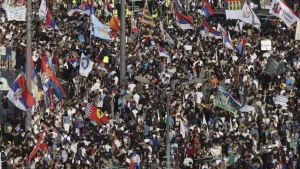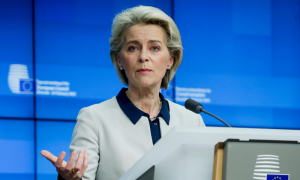Russian diplomats in US work in conditions of extreme spy mania: Envoy

Washington: Russian diplomats in the United States have to work in the conditions of extreme spy mania, Russian Ambassador to the US Anatoly Antonov told reporters.
“They have to work in the conditions of extreme spy mania, which led to the largest expulsion of diplomats from the US and closure of another consulate general. The workload for remaining staff of Russian foreign missions has increased,” Antonov said.
“Strict rules remain in place for movements of embassy workers and Russian official delegation on the territory of the United States. The practice of limiting contacts between our workers and representatives of US federal authorities continues. Requests for meetings with them are sometimes considered for weeks, even months. All of this, of course, complicates normal diplomatic activities,” the ambassador said.
“The volume of tasks for the consular office on all services has grown tremendously. Because of closure of our facilities on the West Coast, representatives of the large Russian-speaking community can no longer resolve consular issues at the place of their residence,” the diplomat noted.
Antonov said visa issues remain a sensitive topic, but Russian diplomats are trying not to allow problems in bilateral relations to hamper US citizens from visiting Russia. “You know very well how US colleagues issue visas and how long lines are at the US embassy and consulates in Russia. We don’t have anything like that, I assure you. Any US citizen may sign up for an appointment and get a Russian visa without any problems,” Antonov said.
Around 100 Russian citizens are held in US prisons, and the US authorities systematically violate their rights, Antonov continued.
“There are around 100 Russian nationals in US prisons. It is no secret that the rights of our citizens in US prisons are systematically violated. They are refused medical assistance for long periods of time (and the quality of such assistance is a separate matter), they are placed in solitary cells under far-fetched pretexts, they experience psychological pressure when they are denied what is available to other prisoners. We are working with prison administrations and US State Department, and we call for stopping arbitrariness and for observing the basic rights of our compatriots,” he said.
Russian embassies and consulates are “providing all Russian citizens held in US prisons with necessary assistance,” he noted. “Our employees visit compatriots in prisons, maintain communication with their relatives and lawyers over the phone,” the diplomat said.
“Sometimes it goes down to outright torture. Konstantin Yaroshenko’s teeth were knocked out during his arrest. Viktor Bout was placed in a special unit for terrorists. Maria Butina has been held in complete isolation for over 90 days, she is allowed to leave the cell only for two hours at night,” Antonov said.
“It is not surprising that by creating unbearable conditions and threatening with a lengthy prison sentence, they practically force our compatriot to sign under made-up accusations. We continue to consider the Butina case as an act of political pressure and blackmailing, and we consider her to be a political prisoner. It is obvious for us that this process is driven by the desire to spur anti-Russian hysteria in the country and find at least something that could be used to confirm speculations about Russia’s ‘interference’ into US affairs. We intend to continue work on Maria’s soonest release and return home,” the ambassador said.
“We want international human rights organizations to finally pay attention to instances of blatant discrimination of Russians in US prisons,” Antonov added.





